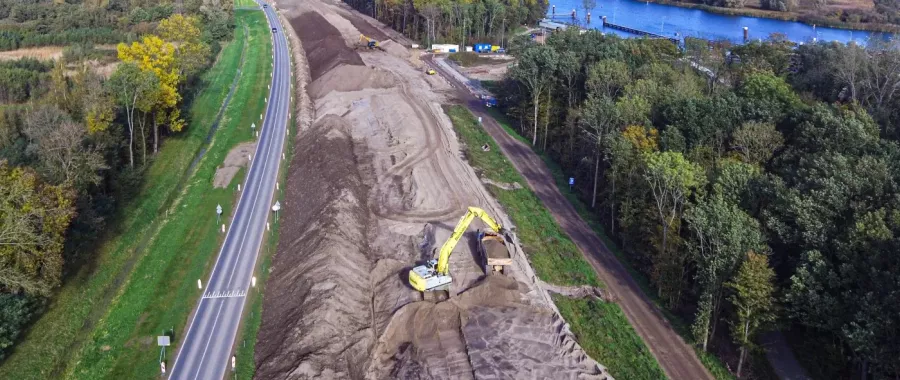The greatest risks when constructing in the Netherlands lie under the ground.
On the one hand due to the marked variation in soil structure and high groundwater levels, and on the other hand because more and more construction work is occurring in inner cities which is also increasingly high-rise. To be able to map out the underground properly so that the aforementioned risks can be mitigated, a sound soil survey is essential at the start of any construction project.
Soil investigation methods
Soil investigations usually commence by carrying out cone penetration tests (CPTs) and drilling.
This video gives an impression of the most common equipment that SOCOTEC has at its disposal to carry out soil investigations.
For a complete overview of the equipment at SOCOTEC’s disposal, please refer to the equipment page.
CPTs are a fast, cost-effective and reliable method for gaining insight into the structure and bearing capacity of the underground. Drilling makes it possible to gain more insight into the composition of the various soil layers; at the same time it is also possible to take (undisturbed) soil samples for geotechnical tests in the lab.
The importance of soil investigation leading to cost savings
The costs of such a survey are usually only a fraction of the total construction costs (less than 0.5%). However, in this case too, cutting costs at the beginning can often lead to a heavier geotechnical design or a longer execution phase or higher unforeseen costs during the execution.
It is therefore essential to consult with one of our geotechnical engineers at an early stage of a construction project. Even before a survey is carried out, we can offer insight into the expected soil structure and possible risks on the basis of public data but above all using our own CPT and drilling archive that contains around 1 million survey points.

Talk to our experts
Early recognition of possible bottlenecks will save money and avoid delays. Carrying out a thorough survey makes it possible to draw up an optimum geotechnical design, naturally taking into account the loads applied and the costs, but also the risks vis-à-vis the surroundings.
We can also optimise the design with an eye to CO2 and nitrogen emissions. The amount of concrete used, of CO2 and nitrogen emitted, can for example be lower for a long, thin foundation pile than for a short pile with a larger diameter. We can provide transparency about the level of emissions of various foundation solutions, which will perhaps facilitate applying for an environmental permit.
CPTs
In principle, CPTs are a fast, cost-effective and reliable method for gaining insight into the structure and bearing capacity of the underground. The advantage of this technique is that it is standardised in Europe (and in fact worldwide too). Not only the equipment to be used, but also the method of implementation. The result is unambiguous, accurate, can be reproduced and is not subject to human interpretation (which is the case for drilling).
To carry out a standard probe, a cone-shaped measuring body is pressed into the ground with rods by using a lorry, for example, as counter pressure. The cone in fact measures the mechanical resistance of the soil whilst penetrating the various soil strata. The soil structure can be derived from the result of the measurement, a CPT graph, and layers with high resistance (sand, gravel) and low resistance (clay, peat, silt) are visible.
During probing, not only the cone resistance is measured but also the local (jacket) adhesion, the pore pressure, conductivity, temperature, etc. The parameters that we measure depend on the type of survey required. For example, the relation between the cone resistance and the local adhesion (friction coefficient) is a clear indication of the type of soil. If the pore pressure is also measured in non-cohesive soils, insight is also gained in the prevailing water pressure at a certain depth. Moreover, pore-pressure probing also shows the presence of thin, water-inhibiting, cohesive interfering layers (of clay or peat) in an aquifer.
We can, for example, detect explosive remnants of war (ERW) with a magnetometer probe, but also determine the length of a sheet pile wall or foundation pile.
With a HPT probe (Hydraulic Profiling Tool), a continuous permeability profile can be generated of the underground.
SOCOTEC carries out various different types of probes and test, such as probes to test the pore pressure and/or adhesion, dynamic penetration tests, seismic probes, probes to test the conductivity, but also the aforementioned magnetometer probes and HPT probes, etc. Each type has its own, specific research objective.
Drilling
To obtain a good overview of the structure of the underground, not only probes and tests but also drilling is always used. Drilling makes it possible to gain more insight into the composition of the various soil layers; at the same time it is also possible to take soil samples for geotechnical tests in the laboratory, standpipes can be placed or borehole measurements carried out.
When drilling is carried out in the context of a geotechnical survey, disturbed and undisturbed soil samples are normally taken. The depth at which this happens is adapted to the previous CPTs. The mechanical properties of the soil samples can be determined in our geotechnical laboratory by classification and strength and deformation tests. These properties are important for the geotechnical design of, among other things, building foundations, construction pits, dewatering, dike reinforcement and infrastructural projects.
Drilling can be done manually or mechanically; each has its own, specific area of application.
Do you want more information about our services ?






